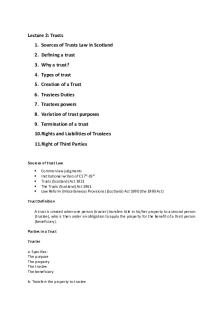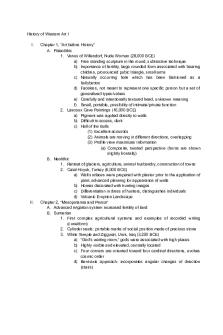Forgiveness Notes PDF

| Title | Forgiveness Notes |
|---|---|
| Course | Positive Psychology |
| Institution | Hofstra University |
| Pages | 4 |
| File Size | 86.2 KB |
| File Type | |
| Total Downloads | 106 |
| Total Views | 126 |
Summary
Forgiveness...
Description
11/2/20 Forgiveness What is Forgiveness? - An individual, voluntary internal process of letting go of feelings and thoughts of resentment, bitterness, anger, and the need for vengeance toward someone who we believe has wronged us, including ourselves - The letting go of negative thoughts, feelings, and behaviors toward the offender Forgiveness - Forgiveness is the process of humanizing those who have led us to feel dehumanized - It is the basic building block of loving relationships with others - Forgiveness is not excusing, condoning, tolerating, or forgetting that one has been hurt because of the actions of another Forgiveness is a Character Strength Underuse of Forgiveness - May compete with your sense of fairness - Can occur because you are motivated by self-protection Overuse of Forgiveness - Person can be too permissive - Can be treated like a doormat by others - Not every person needs a third or fourth chance - Get taken advantage of - Pushover - Harms others when too forgiving because then it can get in the way of others changing their behaviors Forgiveness - “Holding onto anger is like drinking poison and expecting the other person to die” - Forgiveness is a healing character strength - Heals both the parties - Being upset or angry can drain one’s emotional energy - Forgiveness is about freeing yourself up - Forgiveness allows the person to move on You are more likely to forgive when…
-
You remember the times that you have been forgiven in the past and you think about what it felt like to be forgiven You recognize the person’s inherent value You feel safe with the person and believe they won’t do it again You feel compassion towards the person When you believe that it was likely unintentional
Positive Emotions Can Facilitate Forgiveness… - Empathy - Sympathy - Compassion - Romantic love - Altruistic love Forgiveness and wellbeing - Reduction in negative effect and depressive symptoms - Restoration of relationships - Reduction in anxiety - Builds a sense of hope - Greater capacity for conflict management - Greater ability to cope with stress - Physical health - Life satisfaction - Increase in altruistic behaviors (volunteerism and donating to charity) - Partners who characterize their relationship as highly satisfying, committed, and close are more likely to forgive when transgressions occur - More forgiving people experience less of the negative emotions of anger, anxiety, depression, and hostility than do less forgiving people Studies on Forgiveness ● In one study, incest survivors who experiences the forgiveness intervention had at the end of the intervention: ○ Increased abilities to forgive others ○ Increased hopefulness ○ Decreased levels of anxiety and depression ● In a study, college students were randomized to a group that received a forgiveness education program and another group who studied human relations ● The group that received the forgiveness education program showed: ○ Higher levels of hope ○ Increased willingness to forgive others ○ Increased self-esteem
○ Lower levels of anxiety and depression Forgiveness is a process - Cognitive Forgiveness - Emotional Forgiveness - Behavioral Forgiveness People may not want to forgive because they believe… - Forgiveness enables bad behavior - Forgiveness is showing love to the transgressor but not to the victim Dispelling Myths about Forgiveness - Does not necessarily involve the reestablishing the relationship with the person who harmed you - Does not mean a restoration of trust - Does not mean forgetting the transgression - Does not excuse the transgression - Does not mean forgetting the past of the harm caused to you - Does not mean that you believe there ought to be no punishment - Does not mean denying the pain you feel When someone harms us… ● We tend to respond by: ○ Reciprocating harm back to the person ○ Avoid the person ○ Seek revenge Why we out to forgive? ● Forgiving people are: ○ Less likely to be harmful, depressed, hostile, anxious, angry, neurotic ○ They are more likely to be happier, healthier, more agreeable, and more serene ○ They are better able to empathize with others and be spiritual or religious ○ Lower anxiety Pathway to Forgiveness Appreciate an Instance When You Have Been Forgiven - Recall a time that you harmed another person - Helps you notice the common humanity - We all make mistakes
Imagine granting forgiveness to the person who harmed you -
What would say to the person? What kinds of emotions would you experience? What thoughts would be running through your mind? Do you notice any physical sensations?
Forgiveness Letter -
Write a letter of forgiveness if you do not want to confront the person Gives you the ability to select exactly what you want to say Does not require a response from the other person
Practice Empathy -
Practice empathy Try to understand what the other person is experiencing Empathy highly correlates with forgiveness
Benefit Finding -
Write about the benefits of the transgression or the growth experienced as a result of the transgression It can allow for cognitive processing and facilitate forgiveness This DOES NOT mean that you approve of the transgression, but it helps to facilitate acceptance for what happened
How to Seek Forgiveness from Others: ● Confess without an excuse ● Offer of a genuine apology ● Note the pain of the other person (practice empathy) ● Forever value the relationship ● Equalize through restitution (is there anything that can be done to make up for the wrongdoing) ● Say you will never do it again ● Seek forgiveness by asking for it: “Can you forgive me for the pain I caused you?”...
Similar Free PDFs
Popular Institutions
- Tinajero National High School - Annex
- Politeknik Caltex Riau
- Yokohama City University
- SGT University
- University of Al-Qadisiyah
- Divine Word College of Vigan
- Techniek College Rotterdam
- Universidade de Santiago
- Universiti Teknologi MARA Cawangan Johor Kampus Pasir Gudang
- Poltekkes Kemenkes Yogyakarta
- Baguio City National High School
- Colegio san marcos
- preparatoria uno
- Centro de Bachillerato Tecnológico Industrial y de Servicios No. 107
- Dalian Maritime University
- Quang Trung Secondary School
- Colegio Tecnológico en Informática
- Corporación Regional de Educación Superior
- Grupo CEDVA
- Dar Al Uloom University
- Centro de Estudios Preuniversitarios de la Universidad Nacional de Ingeniería
- 上智大学
- Aakash International School, Nuna Majara
- San Felipe Neri Catholic School
- Kang Chiao International School - New Taipei City
- Misamis Occidental National High School
- Institución Educativa Escuela Normal Juan Ladrilleros
- Kolehiyo ng Pantukan
- Batanes State College
- Instituto Continental
- Sekolah Menengah Kejuruan Kesehatan Kaltara (Tarakan)
- Colegio de La Inmaculada Concepcion - Cebu















